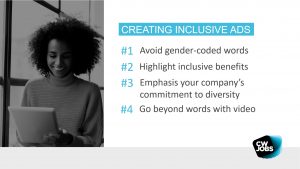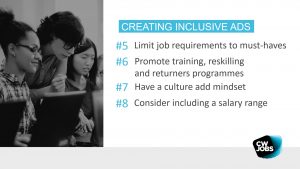Empowering women in tech during Covid-19
As companies prepare their tech hiring strategies for the end of lockdown, diversity and inclusion needs to be a top priority to build a resilient workforce and close the UK’s skills gap.

At CWJobs, we’ve sponsored Tech Talent Charter’s (TCC) Annual Benchmarking Report 2020, which has some encouraging findings about gender diversity during Covid-19. Encouragingly, 1 in 4 business plan to make diversity and inclusion more of a focus to emerge stronger and more resilient from the pandemic.
Recruiting more women into tech roles
TCC’s report finds that 82% of signatories are making gender one of their top priorities. Women currently represent 25% of technical roles, which is an improvement on the 24% from the previous year. Although the rise is small, it comes alongside a net rise in the number of roles counted.
For example, UX Design and Product roles have the highest proportion of women at 37% each. This was closely followed by Data roles with 36% women, and QA roles at 30% women.
The greatest area of opportunity is within engineering and IT operations roles. Last year, 17% of engineering roles were held by women, whereas this year, the figure has risen to 22%. Across IT operations, last year, 20% of roles were held by women, compared to 22% this year.
Small and medium-sized companies leading gender diversity
When it comes to company size, micro-companies are leading the way in having the most balanced gender ratio. The gender diversity at micro-companies (1-9 employees), saw an increase in the proportion of women in tech roles from 42% to 45%.
Medium-sized companies with 50-249 employees have the most room for improvement, with women in technical roles averaging at 23% – the exact same figure as last year.
Whilst large organisations continue to face gender diversity challenges, the number of tech roles held by gender minorities in large companies increased by 31,775, which, proportionally, is a positive change.
Learning and development opportunities are key
As the UK recovers from the Covid crisis, many workers will be looking for new employment. Providing learning and development opportunities can help encourage more women into the industry and close the tech skills gap.
TCC’s report finds that more than 50% of women say the key to convincing them to join the tech sector would be to have more knowledge of, or training in tech. A quarter say that if tech skills training was provided as part of the role, they would consider switching to a career in the industry.
The potential for more diverse talent is there. To enable women to make this career switch, tech companies must have the right training initiatives in place. One company that’s helping under-represented groups increase their digital skills is the Lloyds Bank Academy.
Alongside the West Yorkshire Digital Skills Partnership and Clockwork City, the Academy is training fifteen businesses on using digital tools to increase profitability and exposure. The training teaches business owners how to combat the effects of Covid-19 and to prepare for re-launching their business when restrictions ease.
Flexible working for an inclusive workplace
Female workers do value flexible working as it is the top preferred attribute for them, according to recent research from our sister company Universum, but only two in 10 jobs are advertised with flexible work options.
At CWJobs, we’ve long been advocates for flexible working and the pandemic has shown employers that it can work. Moving forward, flexible working will be essential to building an inclusive workplace. Not only does it encourage more women to apply for roles, but it creates a better work-life balance and can improve productivity.
Research by Peakon shows flexible working discussions increased by approximately 35% amongst workers under 40 during the pandemic. As businesses face increasing pressure to offer flexible working options, we’d expect to see an increasing number of women applying for roles in the tech sector as a result of there being more opportunities.
Create inclusive job ads to attract more women into tech
Companies need to consider how their candidate attraction and employer branding collateral reflect their commitment to gender diversity. For most candidates, the first impression they have of a company is the job description. By creating job ads with diversity in mind, employers can increase their talent pool and close their internal skills gaps more easily.

It’s important to avoid gender-coded language in descriptions so as not to exclude anyone from applying for roles. Smart tools such as our sister brand’s, Totaljobs Gender Bias Decoder, can help companies write more balanced copy.
Providing salary information can also encourage more women to apply for roles. Although the gender pay gap decreased in 2020 for all employees to 15.5%, it is still high at 25% for tech companies.
Companies should highlight any inclusive benefits that they offer, such as parental leave, childcare subsidies and flexible working. Recent research by the UK Government’s Gender and Behavioural Insight Team found that job adverts offering flexible working attracted 30% more applicants and boosted applications from women by 16%.

Promoting training, reskilling and returnship programmes in job descriptions can also encourage more women to apply.
Tackling imposter phenomenon
Imposter phenomenon can affect anyone at any stage in their career, but Totaljobs’ recent research reveals that women are more likely to experience the phenomenon than men.
Covid-19 has had an impact on how workers see themselves and how they believe they are perceived by others. With 71% of furloughed or redundant workers feeling like an ‘imposter’ in their role, it is important for employers to support candidates with this feeling in order to smoothly onboard them and help them continue their careers.
Promoting diversity and inclusion is vital to ensuring that minority communities feel represented in the workplace and less like imposters. Totaljobs’ research finds that when starting a new job, or getting an internal promotion, over 60% of workers say they have felt less like a fake when the job description highlights what’s expected of them. Likewise, 50% of workers say that specific feedback about their work and how they’re doing makes them feel less like an imposter.
CWJobs’ market insights support industry bodies dedicated to diversity and inclusion. We also recently launched Equality Boost, a programmatic retargeting solution to help companies put their diversity and inclusion policies into practice. The initiative offers targeted programmatic advertising that helps hiring managers attract candidates from a variety of backgrounds.
